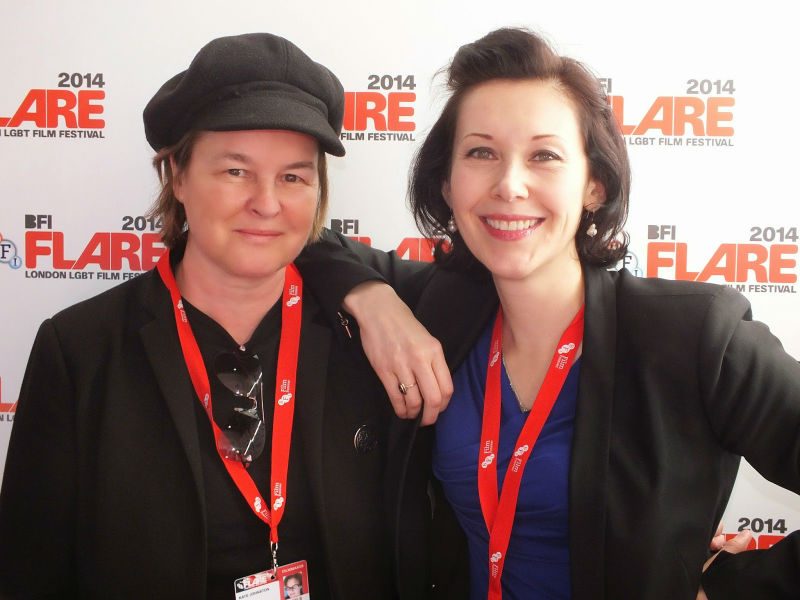We invited Kate Johnston, co-director of the film Tru Love, to pen a response to Diana Simmonds’s recent LOTL critique of the film (“Murder She Wrote”).
When I wrote Tru Love (the first feature draft), I was thinking of the film Harold and Maude, which influenced me from the first time I saw it. I grew up in a projection booth from the age of 5. My father was an old school projectionist and ran the local theatre. I storyboarded images for films from a very early age and lived in that imaginary world. I was steeped in cinema from Capra to Bergman and went on to immerse myself in art house cinema throughout my adult life. European cinema particularly intrigued me; they were not afraid of sex or death or bittersweet endings, tragedy mixed with comedy, the minor notes. It was all there. And I truly loved the American film (1971) Harold and Maude, a story about an 80 year-old character named Maude who lived life fully, against all odds and against social convention and became friends and lovers with a young man named Harold who drove a hearse and wanted to die. She was wild and deep and funny and taught him how to live and how to love. That was her gift to him before leaving this world. When he says at the end “I love you Maude, don’t leave me.” She replies “Oh, Harold, that’s wonderful! Go out and love some more.” It was bittersweet. You knew he was going to be okay. His life was changed by Maude. In my film, that is the gift I wanted Alice to give to Tru (who was afraid to live and to love). I wanted Tru Love to be about removing the blocks we have set up to protect our fear about love itself. I did not want to write about a ‘perfect person’ out there—Alice—who will complete us or make our life complete forever. That to me is more a fairytale we have been fed. Tru and Alice were catalysts for each other, for change, for redemption.
I never for a moment thought that Alice was being 'murdered.' Death is really just a part of life, all of our lives. If we love someone, eventually they will leave or die, or we will. It is the nature of being alive. The great cosmic joke. I came out in the ’70s and have lost so many people I have loved in my own life—all of my older fabulous gay male friends to AIDS, an ex lover to breast cancer, my best friend in life who was trans to suicide, my mother shortly after. There IS tragedy in life. This is not about punishing anyone. This is about things ending and things beginning and how do we move forward from that. How do we pick up the pieces in life when we are shuttered and shattered? That is both personal to me and also deeply universal. We all have been there. There is beauty and sadness, humour and love and cruelty — and how do we even survive alone and also together? I want to see it all and write about it all. And I believe there is room for all of it at the table. Many films and TV shows now have lesbians or queer people who are represented in all genres. Comedy, tragedy, drama, horror, sci-fi. It seems to me that for the most part we are no longer subject to those old negative tropes of lesbians being psychopathic murderers, predators or full of self-loathing — being killed off with homophobic intent like they used to be. And, as independent filmmakers, we still need to be able to tell our own stories — whether tragic or comic or both. These stories are our lives. To demand anything less would be reductionist in my opinion and the real tragedy. I would love to see it all. And I suppose that is my other concern, when an artist is responsible to a whole community or subculture, for sins of the past in a culture that she didn’t create, something can get lost in the translation: The artist themselves. This is something that is not asked of straight filmmakers. I hope this opens the door to more dialogue. We are a fluid, trans sexual, trans gender people; we are verbs, not nouns, shifting, being. There is room for everyone at the table. Or, at least I believe there is. I got this message the other day from an 80 year-old lesbian in Australia named Vera that touched me deeply:
"Your film left me with a deep feeling of yearning. I love Tru Love, ordered pre-release and then watched it four times in the first two days I owned it. All of us who put our dreams on hold because of children or if we've careers, have that same yearning to be fulfilled someday. Are you putting the script into book form, so we can hold it ever close to our chests? I'm about to turn 80, so I need to be bold and ask for what I really want."
This is why I make films. For all of the Veras out there. For all of us.
To read the original article by Diana Simmonds click here: "Murder She Wrote".
